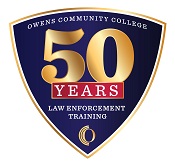|
This program will allow students to complete the Ohio Peace Officer Training Academy (OPOTA) as part of their associate’s degree. Approximately half of the degree will be the academy and the other half will be composed of basic and general education courses as well as some fundamental criminal justice courses. This will position these students to enter the law enforcement field with an associate’s degree and/or to continue on to pursue a bachelor’s degree in criminal justice or a related field.
This program also affords current and recent graduates of Ohio Peace Officer Training Academies to return to school and acquire an associate’s degree. While not all area law enforcement agencies require an associate’s or bachelor’s degree for hire, some do.
Founded in 1970, the Ohio Basic Peace Officer Training Academy at Owens Community College is offered in cooperation with the Ohio Peace Officers Training Commission. Police Academy students take courses in patrol operations, firearms, defensive tactics and criminal investigation using modern, high-tech police equipment. Students also receive expert instruction from local police officers, sheriff’s deputies and corrections officers, as well as state and federal agents.
Successful graduates of the Academy portion (semesters 1 and 2) are eligible to take the Ohio Basic Peace Officer Certification Examination.

Department of Criminal Justice and Ohio Basic Peace Officer Training
Administration
|
Toledo Campus
|
Phone
|
Email
|
|
Dr. Ruth Babel-Smith, Chair, Criminal Justice
|
Heritage Hall 106N |
(567) 661-7613 |
ruth_babelsmith@owens.edu |
|
Mark King, Manager, OPOTA Program
|
Center for Emergency Preparedness (FTS) 121 |
(567) 661-7439 |
mark_king@owens.edu |
Accreditation
Accredited by the Ohio Attorney General - Ohio Peace Officer Training Commission (OPOTC.) Accreditation is ongoing with unannounced on-site inspections by an OPOTC Field Representative. Full on-site inspections are done every three years. The last full on-site inspection was conducted February 2017. For more information concerning accreditation standards, contact the Ohio Attorney General Mike DeWine, 30 East Broad Street, 14th Floor, Columbus, Ohio, 43215, phone number 800-282-0515 or 614-466-4986, web address www.ohioattorneygeneral.gov.
Student Learning Outcomes
Student will be able to:
- Demonstrate the ability to make correct and ethical decisions.
- Apply basic criminal law to various events.
- Write various criminal justice reports.
- Demonstrate correctly the procedure to make a felony stop and arrest.
- Demonstrate correctly traffic stop operations.
- Discuss the concept of law enforcement from a sociological perspective.
- Discuss the sociological and psychological factors leading to crime.
- Discuss the state and local governmental constructs relevant to law enforcement and the justice system.
Student Advisement
There are no special admission requirements for this program. However, students with a felony conviction or a conviction regarding domestic violence are disqualified from entry into the academy. Further, students are advised that if they have or acquire a conviction regarding drugs, weapons, or moral turpitude, they will find employment in the criminal justice field extremely unlikely. Before students gain admittance to the academy portion of the program, they must pass a background check and be fingerprinted, have the OPOTC Student Health Data form completed by a physician, pass a five-panel drug screen, provide copies of their driver’s license and proof of auto insurance, and pass a physical conditioning pre-test which reflects 70% of the physical conditioning required for successful completion of the academy.
Students must be 18 to participate in firearms training. Further, students may complete the academy prior to their 21st birthday but it is unlikely they will receive a commission prior to turning 21. Students who do not receive a commission within 2 years of completing the OPOTA training will have to repeat the OPOTA training to become employable as a peace officer in Ohio.
Employment Opportunities
According to the Bureau of Labor Statistics (BLS) in May 2015, Ohio police officers earned an average of $56,090. This figure did not include overtime wages. They also received paid vacation, sick leave and medical and life insurance. Many retire at half-pay after 25 or 30 years of service.
Approximately 86% percent of all police officers, sheriffs and detectives worked for local government in 2015. The rest worked for state or federal police agencies. The BLS projects employment for police officers and detectives to increase approximately 8.5% percent in our region.
Persons with college training in police science or who have military experience, or both, should have the best chances for a job, the BLS reports.
Fill out our Basic Peace Officer Academy Interest Card to receive more information.
|